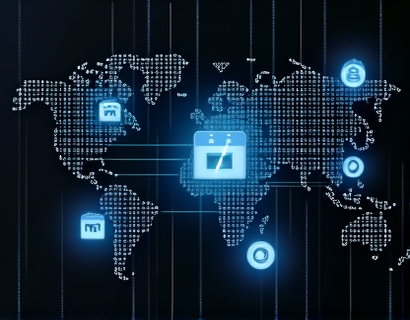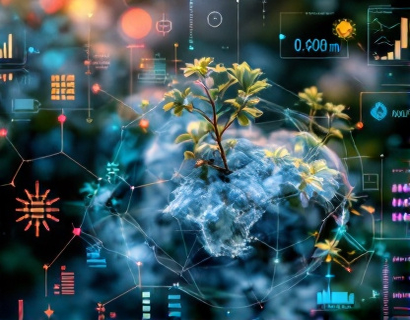Autonomous AI Agents: Streamlining Continuous Objectives for Business and Personal Productivity Boost
In the rapidly evolving landscape of business and personal productivity, the integration of Autonomous AI Agents stands out as a transformative force. These intelligent systems are designed to operate on behalf of individuals and organizations, continuously managing tasks and objectives to ensure that core activities receive the focus they deserve. By automating routine and repetitive tasks, Autonomous AI Agents enable businesses and individuals to achieve more with less effort, fostering an environment where innovation and growth can thrive.
The concept of Autonomous AI Agents is rooted in the broader field of Artificial Intelligence, specifically in the subfield of Autonomous Systems. These systems are programmed to perform a wide range of tasks with minimal human intervention, adapting to new inputs and changing conditions in real-time. The primary goal is to enhance efficiency and productivity by offloading mundane tasks to machines, allowing human users to concentrate on higher-value activities that require creativity, critical thinking, and emotional intelligence.
Understanding Autonomous AI Agents
To fully grasp the potential of Autonomous AI Agents, it is essential to understand their core components and functionalities. At their core, these agents are equipped with advanced algorithms and machine learning models that enable them to learn from data, improve over time, and make decisions with a degree of autonomy. This learning capability is crucial, as it allows the agents to adapt to new scenarios and optimize their performance continuously.
Autonomous AI Agents can be categorized into different types based on their applications and the level of autonomy they possess. For instance, some agents are designed for specific tasks such as data analysis, customer service, or project management, while others are more general-purpose, capable of handling a wide array of responsibilities. The versatility of these agents makes them invaluable in various sectors, from healthcare and finance to manufacturing and retail.
Benefits for Businesses
For businesses, the adoption of Autonomous AI Agents can lead to significant improvements in operational efficiency and cost reduction. By automating routine tasks, companies can reduce the workload on their human employees, minimizing the risk of errors and freeing up staff to focus on strategic initiatives. This shift not only enhances productivity but also improves job satisfaction, as employees are able to engage in more meaningful and challenging work.
One of the most notable benefits is the ability to achieve 24/7 operation without the need for overtime or additional hiring. Autonomous AI Agents can work around the clock, ensuring that tasks are completed promptly and consistently. This continuous operation is particularly beneficial for businesses operating in global markets, where time zone differences can pose challenges for traditional workforce management.
Moreover, the data-driven insights generated by these agents can provide valuable insights into business processes and customer behavior. By analyzing large datasets, Autonomous AI Agents can identify trends, predict outcomes, and recommend actions that can drive growth and innovation. This data-centric approach enables businesses to make informed decisions, stay ahead of the competition, and adapt to market changes swiftly.
Enhancing Personal Productivity
Beyond the corporate realm, Autonomous AI Agents offer substantial benefits for individuals seeking to boost their personal productivity. In today's fast-paced world, managing a multitude of tasks and responsibilities can be overwhelming. Autonomous AI Agents serve as personal assistants, handling everything from scheduling appointments and managing emails to tracking expenses and organizing digital files.
For students and professionals alike, these agents can significantly reduce the time spent on administrative tasks, allowing more time for learning, creativity, and personal development. By offloading the burden of organization and reminders, individuals can maintain a clearer mind and focus on their goals with greater clarity and purpose.
Additionally, the customization capabilities of Autonomous AI Agents mean that they can be tailored to suit individual preferences and work styles. Whether it's prioritizing certain tasks, setting specific reminders, or integrating with other tools and platforms, these agents can be configured to enhance the user's unique productivity workflow.
Practical Strategies for Maximizing Productivity
To fully leverage the potential of Autonomous AI Agents, it is important to adopt strategic approaches that maximize their effectiveness. Here are some practical strategies for both businesses and individuals:
- Define Clear Objectives: Clearly define the tasks and objectives you want the AI agent to manage. This clarity ensures that the agent focuses on the most critical activities and avoids unnecessary distractions.
- Integrate with Existing Systems: Ensure that the AI agent can seamlessly integrate with your current tools and platforms. This integration enhances efficiency by eliminating the need for manual data transfer and synchronization.
- Monitor and Adjust: Regularly monitor the performance of the AI agent and make adjustments as needed. This ongoing evaluation helps in fine-tuning the agent's capabilities and ensuring it continues to meet your evolving needs.
- Leverage Data Insights: Utilize the data and insights generated by the AI agent to inform decision-making processes. This data-driven approach can lead to more effective strategies and better outcomes.
- Foster a Collaborative Environment: Encourage a culture of collaboration between human teams and AI agents. By combining the strengths of both, organizations can achieve higher levels of productivity and innovation.
For businesses, implementing these strategies can lead to a more agile and responsive organization. By automating routine tasks and providing actionable insights, AI agents can help companies stay competitive and adapt to changing market conditions. For individuals, these strategies can transform daily routines, reducing stress and increasing the time available for personal and professional growth.
Challenges and Considerations
While the benefits of Autonomous AI Agents are clear, it is important to acknowledge and address potential challenges and considerations. One of the primary concerns is the initial investment required to implement these systems. However, the long-term savings in labor costs and increased efficiency often justify the upfront expenses.
Another consideration is the need for robust security measures to protect sensitive data and ensure compliance with regulations. AI agents handle a significant amount of information, making them potential targets for cyber threats. Implementing strong encryption, access controls, and regular security audits is essential to mitigate these risks.
There is also the issue of job displacement, as some tasks traditionally performed by humans may be automated. However, rather than viewing this as a negative, organizations can focus on reskilling and upskilling their workforce to take on new roles that complement the capabilities of AI agents. This transition can lead to a more dynamic and innovative work environment.
Future Trends and Innovations
The field of Autonomous AI Agents is rapidly evolving, with ongoing research and development pushing the boundaries of what these systems can achieve. One exciting trend is the integration of AI agents with other emerging technologies such as the Internet of Things (IoT), 5G networks, and edge computing. These integrations can further enhance the capabilities of AI agents, enabling more real-time data processing and smarter decision-making.
Another area of innovation is the development of more sophisticated natural language processing (NLP) and machine learning models. These advancements will allow AI agents to understand and respond to human commands more accurately, making them even more effective personal assistants and collaborators.
Looking ahead, the future of Autonomous AI Agents holds the promise of even greater autonomy and intelligence. As these systems become more advanced, they will not only manage tasks but also anticipate needs, proactively suggest solutions, and continuously learn from their environment to provide increasingly valuable support.
In conclusion, Autonomous AI Agents represent a significant leap forward in the quest for enhanced productivity and efficiency. By automating routine tasks and providing data-driven insights, these intelligent systems empower businesses and individuals to focus on their core strengths and achieve their goals more effectively. As the technology continues to evolve, the potential for transformation in both professional and personal domains is immense.











































